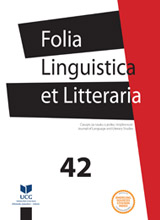Assessment of FL Syllabi at Three Montenegrin Universities
Assessment of FL Syllabi at Three Montenegrin Universities
Author(s): Branka Živković, Igor LakićSubject(s): Language studies, Language and Literature Studies
Published by: Filološki fakultet, Nikšić
Keywords: Erasmus+ ReFLAME project; FL syllabi assessment; general FL courses; FL for specific purposes courses
Summary/Abstract: One of the aims of the Erasmus+ ReFLAME project is to update the present foreign language (FL) syllabi at the non-philological departments at the three Montenegrin universities – the University of Montenegro (UoM), Mediterranean University (MedUni) and the University of Donja Gorica (UDG). To this end, the first task was to collect and assess all the first and second FL syllabi at the three Montenegrin universities. The analysis included examining the FL syllabi to provide the data regarding, among other things, the number of the syllabi collected, the faculties they are taught at, the foreign languages being taught, the number of general FL courses as opposed to FL for specific purposes courses, as well as the information on the textbooks and literature used. The results of the analysis of 226 FL syllabi, corresponding to 181 courses offered at 30 faculties at the three universities, show that the vast majority of these are taught at UoM (195), whereas 24 are taught at MedUni and 7 at UDG respectively. At UoM, 137 FL syllabi cover English, while 58 are related to other languages – Italian (14), German (14), Russian (14) and French (16). All of the overall 31 syllabi at MedUni and UDG pertain to English. A slightly higher number of the syllabi cover FL for specific purposes courses (113) compared to general FL courses (111), and only two pertain to FL for academic purposes courses. Most of the FL syllabi do not mention any exit level to be achieved, and thus are not in line with the Montenegrin Law on Higher Education (which stipulates a C1 exit level according to the CEFR). In terms of the textbooks and literature used, all the general FL courses are well equipped with appropriate textbooks. Nonetheless, there is a notable lack of adequate textbooks for FL for specific purposes courses in particular academic fields. This result was considered when making a decision on which LSP textbooks should be produced as part of the project. The overall findings of the FL syllabi analysis will also be of great use in the development stage of the project in which one of the tasks will deal explicitly with updating the current FL syllabi.
Journal: Folia Linguistica et Litteraria
- Issue Year: 2022
- Issue No: 42
- Page Range: 45-57
- Page Count: 13
- Language: English

